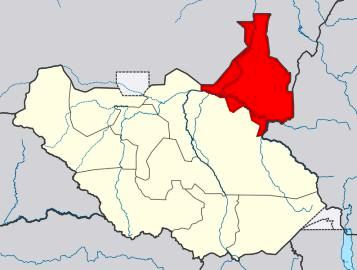Shilluk King moved to Juba after clashes in Upper Nile
December 4, 2022 (JUBA) – South Sudan’s President Salva Kiir said he moved the King of Shilluk Kingdom from Fashoda to Juba after the fighting pitting different factions in the Upper Nile region intensified.
Reth Kwongo Dak Padiet was reportedly moved to Juba on Friday after the president sent a boat that transported him to Malakal town on Thursday.
Although many armed groups currently operate in the Upper Nile region, Kiir did not mention why it was difficult to contain the situation.
South Sudan government troops (SSPDF), forces loyal to General Johnson Olony and fighters those loyal to the country’s First Vice President Riek Machar maintain heavy physical presence in the area.
Also, fighters allied to the armed opposition’s (SPLM/A-IO) former chief of staff, General Simon Gatwech Dual are also operating in the area and usually clash with other forces over territorial claims and control.
Speaking at the ruling party’s (SPLM) National Liberation Council (NLC) meeting, the South Sudanese leader said his administration learned of the situation in Upper Nile region and dispatched a boat to take the King of the Shilluk from Pashoda County to Malakal town.
“When the situation intensified and we saw that he (King) was in Pashoda, we tried to move him,” Kiir said on Friday.
He added, “So, we sent a boat to bring him to Malakal and from Malakal yesterday [Thursday], we airlifted him by air to Juba here. The King is safe and I will meet him in Juba here.”
Fighting, according to multiple sources, first started in Panyikang and Fangak counties in July, later escalating into heavy conflict in August.
It started as factional fighting between the former Kitgwang factions led by Generals Gatwech and Olony, but later involved armed youth.
In November, the violence reached Fashoda county headquarters, where the palace of the King of Chollo is located. The conflict displaced several innocent women, children, the elderly and disabled.
(ST)

